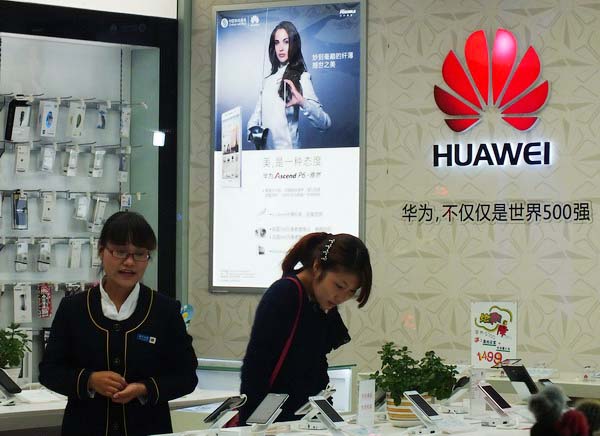|
 Although Huawei failed to reach its target of 10 percent growth in revenue, analysts said that the company posted impressive financial results given the stagnation of the global telecom sector and the increasingly fierce competition scenario. Photo taken in Yichang, Hubei province on Nov 6, 2013. [Liu Junfeng / Asianewsphoto] |
Huawei Technologies Co Ltd, the world's second-largest telecom equipment maker, said on Wednesday that its operating profit jumped more than 40 percent in 2013, despite some major setbacks in the United States and Australia as well as increased scrutiny from authorities in the United Kingdom over cybersecurity issues.
The Shenzhen-based company said its unaudited 2013 operating profit ranged from 28.6 billion yuan ($4.70 billion) to 29.4 billion yuan. That compares with an audited 2012 operating profit of 19.96 billion yuan and represents an increase of at least 43.3 percent.
Its revenue is expected to range from 238 billion yuan to 240 billion yuan, an increase of at least 8 percent year-on-year, the company said.
Although Huawei failed to reach its target of 10 percent growth in revenue, analysts said that the company posted impressive financial results given the stagnation of the global telecom sector and the increasingly fierce competition scenario.
Cathy Meng, Huawei's chief financial officer, attributed the continued growth to the company's commitment to innovation.
"In 2013 alone, the company's investment in R&D reached 33 billion yuan, accounting for about 14 percent of our sales revenue," said Meng, the daughter of Ren Zhengfei, Huawei's founder.
Meng didn't reveal detailed growth figures for Huawei's three business groups - carrier networks, consumer and enterprise - but said the proportion of revenue from services and software in the carrier business increased to 37 percent in 2013 from 34 percent in 2012.
Huawei, founded in 1987, is known for aggressively gaining sales in the global telecom equipment sector. According to Meng, more than 75 percent of Huawei's carrier network business group's revenue in 2013 came from the world's top 50 telecom carriers.
The company invested a lot together with telecom carriers to build global 4G networks in the past several years, and some of those carriers are now paying Huawei back, industry observers said.
"That's why Huawei had such a surge in its operating profit in the past year," said Xiang Ligang, a Beijing-based telecom expert.
Xiang added the 8 percent year-on-year growth in revenue would be very hard to achieve for other major telecom industry players.
"Huawei's revenue has reached a gigantic size. It's challenging for the company to maintain double-digit growth. If Huawei can maintain its growth at 8 percent in the coming years, I'd call it a great job," he said.
Zhao Hailin, an analyst with research firm IHS iSuppli, said that based on the unaudited numbers, Huawei's gross profit margin was about 12 percent in 2013.
"Huawei is already the top company in the industry in terms of gross profit margin," Zhao said, adding the figure reflects a good performance by the company's management.
But for a company with 70 percent of its business coming from overseas markets, Huawei is not in the comfort zone yet. The unlisted company has repeatedly said it has no spying links with the Chinese government, but it was recently barred from rolling out its core carrier business in the US due to cybersecurity worries.
Scott Sykes, vice-president and head of international media affairs at Huawei, said that the picture in the US is not rosy and will not be in the "foreseeable future", but that the company remains ready, willing and available to do business there.
"We think that in time, we will have opportunities in the US, when pragmatism wins over protectionism, but we don't know how long it will take for that to happen," Sykes said.
Despite all the challenges, Huawei said it's doing its best to participate in the US market. Every year, the company spends about $6 billion in the US, buying components to make its equipment.
"So we're doing our part, in good faith, to stimulate the US economy and bring jobs to the US. All we want is to be able to fairly compete for business in the world's largest telecommunication market," Sykes added.
